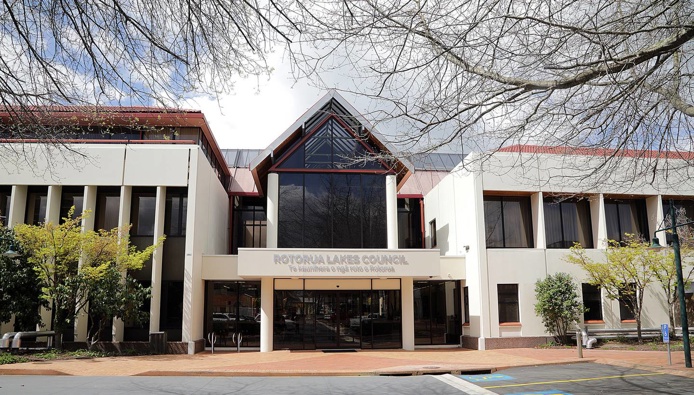Follow
the podcast on


Seven senior staff at Rotorua Lakes Council can now call themselves deputy chief executives, and one has had a minimum $40,000 pay rise.
Another deputy chief executive is undergoing a salary review.
The move has been described as "unbelievable" and “laughable” by a former Rotorua mayor, who says he believes there is little chance the change will enhance services to ratepayers.
A local government expert says it represents a “detachment from reality”, but a local government managers representative says the new titles are based on outcomes instead of functions.
Council chief executive Geoff Williams said there was an “organisational realignment” under way, which was an “exciting opportunity” to create a more adaptable and responsive organisation.
Five of the seven deputy chief executives were formerly referred to as “group managers”. One was formerly the manager of the chief executive's office, but now holds the title of "deputy chief executive, chief executive's group".
One salary increased due to a "significant change in responsibility", a council spokeswoman said.
The spokeswoman would not say who received the pay increase, nor specifically how much it was.
However, the council did reveal what salary band the person was previously in, and what band they were now in.
“The band the person was in was $140,000 - $159,999 and they moved to band $200,000 - $279,999.”
This meant at a minimum, the pay rise was just over $40,000 and at a maximum, nearly $140,000.
Salary adjustments were due to a role including “increased responsibility for developing and overseeing strategic outcomes”, much more so than in the person’s previous role, the spokeswoman said.
In a written statement, Williams said the impacts of Covid-19 had changed the way the council worked and what the community expected of the council.
That was “alongside a need for a co-ordinated all-of-government approach to addressing local challenges”.
“There is an increased expectation for [the] council to play a strong leadership role, build our economy and promote community wellbeing.”
He said the council was undertaking “organisational realignment” changing its approach and its way of working to meet the community’s needs.
“As a result, [the council] is moving from the existing group structure (business support, infrastructure, operations, and strategy) to align with six key outcome areas, plus the chief executive’s group, each headed by a deputy chief executive.
“This is an exciting opportunity for us to create a more adaptable and responsive organisation that is capable of delivering real value for our community, in a highly uncertain environment.”
The council spokeswoman said the proposed new structure was shared with the organisation on March 29 and was in a feedback review process as it worked to finalise the details of what each of the outcome areas would be.
“The deputy chief executive roles reflect enhanced responsibility and accountability, moving from managing services to being responsible for achieving the strategic outcomes for each area.”
Former titles, such as chief financial officer, and their functions were incorporated into the new deputy chief executive titles, she said.
Former Rotorua mayor Grahame Hall said the new deputy chief executive titles were in his view “unbelievable” and he believed it would be “costly and confusing” for ratepayers.
"The primary role of staff is ultimately to serve the ratepayers and it is hard to imagine that a name change will improve their output.”
Hall, who was mayor of Rotorua from 1992 to 2004 said when it came to salary reviews, there was “a lot attached to a name” and the costs associated with designated name changes were “not insignificant”.
He said in his opinion: "The latest move is commonly called corporate creep and it is laughable in a comparatively small organisation like our council.”
Massey University local government expert Andy Asquith said the move, in his view, looked “questionable” and sent “a very negative message to the community”.
“How do you justify that kind of pay rise in the current climate?
“There seems to be a detachment from reality somewhere here.
Asquith said he was not necessarily against well-paying jobs in the public sector, but salary increases of that size needed to be questioned.
Taituarā Society of Local Government Managers acting chief executive Raymond Horan said Rotorua Lakes Council had moved to an “outcomes-based structure” in which functional-based titles were no longer relevant.
He believed the term deputy chief executive was to draw a “clear distinction between the old structure and the new”.
“Further it appears intended to attract people of a particular calibre and level of experience.”
He noted remuneration was determined by “responsibilities, competencies and experience and not job title”.
Local Democracy Reporting sought further comment from the council and mayor.
On Monday evening Rotorua mayor Steve Chadwick said Rotorua was facing some of the biggest challenges ever – including housing, safety, employment, climate resilience.
"The council has heard from the community that there is an urgent need to address those issues.
“We employ and expect the chief executive to carry out the expectations in the Long-term Plan, and to do so within the funding envelope."
Also in response, the council put out a press release which stated:
“Chief executive Geoff Williams says the realignment will ensure the organisation is fit-for-purpose."
Williams said: “The implications of Covid-19 have changed ways of working, and life, for everyone.
“The social and economic impacts of the pandemic have been felt widely and for Rotorua, issues facing our district pre-pandemic have been exacerbated since lockdown.
“Key to addressing these issues are strong partnerships with iwi, central government and government agencies.
“To foster and strengthen these partnerships, and to best meet the needs of our community, Rotorua Lakes Council will be evolving its strategic direction to enable us to respond to current and future challenges and opportunities."
The release said: “The deputy chief executives have been responsible for drafting what their outcome areas will look like and consultation with the wider organisation is now underway.
“While the final structure is yet to be decided upon, the deputy chief executives are already operating in their new roles."
Williams said: “This indicates the enhanced responsibility and accountability these individuals have for ensuring strategic outcomes are met."
The release said the deputy chief executives were all appointed internally, with two staff taking on a significant increase in responsibility.
“While no council staff have received pay increases during the past 12 months, one deputy chief executive took on a new role entirely and their remuneration was adjusted to reflect that.
“One other deputy chief executive is in the process of having their salary reviewed."
Williams said: “This is not about simply creating new job titles for the sake of it, or paying people more because they have a new title.
“The deputy chief executive roles will demand a lot and our next step in the process is to ensure the organisational functions and activities match the required outcomes.
“This is an exciting opportunity to create a more adaptable and responsive organisation that is capable of delivering real value for our community, in a highly uncertain environment.”
The council was also asked how much the “organisational realignment” had cost to date, and how much more it was expected to cost.
A council spokeswoman said the council was not declining to answer that question but would treat it as an official information request, which means the response will not be due for 20 working days.

text by Felix Desmarais, Local Democracy Reporting
Take your Radio, Podcasts and Music with you









